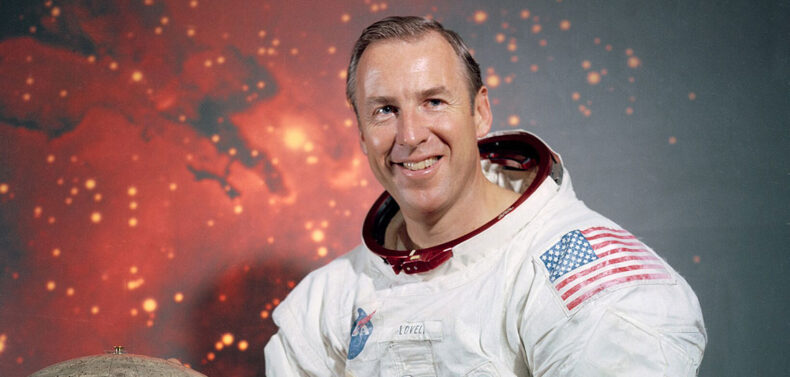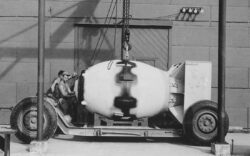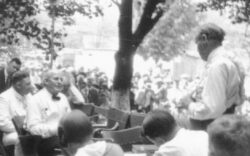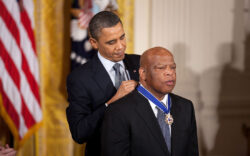“Astronaut” is Greek for “star sailor.” Jim Lovell was a Navy officer who sailed the eternal ocean of space. He died at the age of 97 on Aug. 7, an astronaut whose exploits in Earth orbit and around the moon brought science fiction to life during a surging “space race” between the United States and Russia.
“The real friends of the space voyagers are the stars,” Lovell said. “Their friendly, familiar patterns are constant companions—unchanging, out there.” Star sailor Lovell indeed went “out there” during his four space flights, two during the Earth-orbiting Gemini program of the mid-1960s and two during the Apollo program of manned flights to the moon from 1968–1972. Lovell flew to lunar orbit aboard the Apollo 8 spaceship with crewmates Frank Borman and Bill Anders during the Christmas season of 1968. Though Apollo 8 did not land on the moon’s surface, the dramatic flight was the first manned lunar mission, fulfilling the prophecy French writer Jules Verne had envisioned nearly a century before in his prescient 1869 novel, Around the Moon.
During the Apollo 8 voyage to lunar orbit, the three astronauts captivated television viewers back on Earth with broadcasts of their unprecedented journey—the first human flight to another world in space. When the astronauts read the creation story from the Bible’s book of Genesis while showing the bleak moonscape outside their spacecraft’s windows, some objected to the religious reference, but millions more found the poetry of the words timely, appropriate and reassuring at the end of a year blemished by assassinations, war and riots on the streets of a divided nation. After the Apollo 8 flight boosted a beleaguered America, Lovell, Borman and Anders received a telegram from an unknown citizen with a simple message of gratitude: “To the crew of Apollo 8: Thank you. You saved 1968.”
Lovell later recalled that seeing the moon close-up made him concerned about his home planet, Earth. “When I circled the moon and looked back at Earth, my outlook on life and my viewpoint of Earth changed,” he said. “Earth is a spaceship, just like Apollo, and just like Apollo, the crew must learn to live and work together. We must learn to manage the resources of this world with new imagination.” The famous “Earthrise” photo of Earth poised in space above a lifeless lunar landscape was taken during Lovell’s Apollo 8 voyage in 1968, and it remains a symbol of the environmentalist movement today.
By 1970, Lovell was in command of the Apollo 13 spacecraft. Also along for the rocket ride were fellow astronauts Fred Haise and Jack Swigert. Lovell and Haise were to make the third landing on the moon in the two-man lunar module while Swigert stayed aboard the Apollo ship awaiting his crewmates’ return from the surface. It was not to be. In the Stygian darkness of deep space, an explosion aboard the craft scuttled any plans for a lunar landing and shattered Lovell’s dream of walking on the same world that astronauts Neil Armstrong and Buzz Aldrin first visited in 1969.
The Apollo 13 trio had to use their tiny landing craft as a cosmic lifeboat during a harrowing return to Earth that was depicted in the 1995 film Apollo 13. Actor Tom Hanks played Lovell in the movie, and Lovell himself made a cameo appearance as a naval officer on the recovery ship welcoming the weary astronauts home. When the old astronaut died, Hanks said in tribute, “God speed you on this next voyage, Jim Lovell.”
Navy aviator Lovell said of landing on aircraft carriers, “For most of the time, carrier aviation is more challenging than flying in a spacecraft.” Apollo 13 was a challenge for Lovell and his crew, and they were up to the challenge.
Buzz Aldrin, who landed on the moon with Neil Armstrong in 1969, is now the oldest of the Apollo astronauts at age 95. He is one of only five humans left alive who have been to the moon. All of them know what Jim Lovell meant when he said, “We do not realize what we have on Earth until we leave it.”
Like what you just read? Support Flagpole by making a donation today. Every dollar you give helps fund our ongoing mission to provide Athens with quality, independent journalism.









